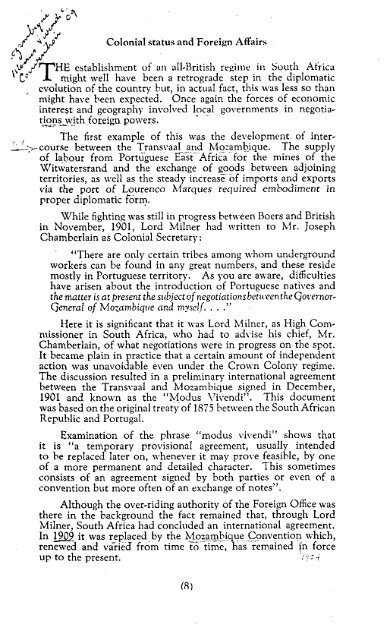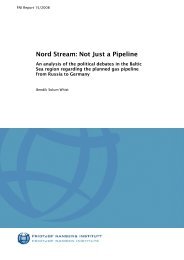SAIIA SOUTH AFRICAN DIPLOMATS ABROAD.pdf
SAIIA SOUTH AFRICAN DIPLOMATS ABROAD.pdf
SAIIA SOUTH AFRICAN DIPLOMATS ABROAD.pdf
You also want an ePaper? Increase the reach of your titles
YUMPU automatically turns print PDFs into web optimized ePapers that Google loves.
Colonial status and Foreign Affairs<br />
establishment of an all-British regime in South Africa<br />
might well have been a retrograde step in the diplomatic<br />
evolution of the country but, in actual fact, this was less so than<br />
might have been expected. Once again the forces of economic<br />
interest and geography involved local governments in negotiationsjvith<br />
foreign powers.<br />
The first example of this was the development of inter-<br />
_->- course between the Transvaal and Mozambique. The supply<br />
of labour from Portuguese East Africa for the mines of the<br />
Witwatersrand and the exchange of goods between adjoining<br />
territories, as well as the steady increase of imports and exports<br />
via the port of Lourenco Marques required embodiment in<br />
proper diplomatic form.<br />
While fighting was still in progress between Boers and British<br />
in November, 1901, Lord Milner had written to Mr. Joseph<br />
Chamberlain as Colonial Secretary:<br />
"There are only certain tribes among whom underground<br />
workers can be found in any great numbers, and these reside<br />
mostly in Portuguese territory. As you are aware, difficulties<br />
have arisen about the introduction of Portuguese natives and<br />
the matter is at present the subject of negotiationsbetu-een the Qovern or*<br />
Qeneral of Mozambique and myself. ..."<br />
Here it is significant that it was Lord Milner, as High Commissioner<br />
in South Africa, who had to advise his chief, Mr.<br />
Chamberlain, of what negotiations were in progress on the spot.<br />
It became plain in practice that a certain amount of independent<br />
action was unavoidable even under the Crown Colony regime.<br />
The discussion resulted in a preliminary international agreement<br />
between the Transvaal and Mozambique signed in December,<br />
1901 and known as the "Modus Vivendi", This document<br />
was based on the original treaty of 1875 between the South African<br />
Republic and Portugal.<br />
Examination of the phrase "modus vivendi" shows that<br />
it is "a temporary provisional agreement, usually intended<br />
to be replaced later on, whenever it may prove feasible, by one<br />
of a more permanent and detailed character. This sometimes<br />
consists of an agreement signed by both parties or even of a<br />
convention but more often of an exchange of notes".<br />
Although the over-riding authority of the Foreign Office was<br />
there in the background the fact remained that, through Lord<br />
Milner, South Africa had concluded an international agreement.<br />
In 1909 it was replaced by the Mozambique Convention which,<br />
renewed and varied from time to time, has remained jn force<br />
up to the present. «'-/-f<br />
(ft)













